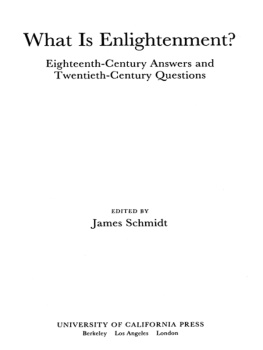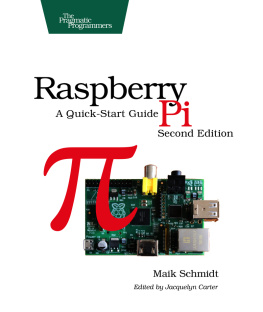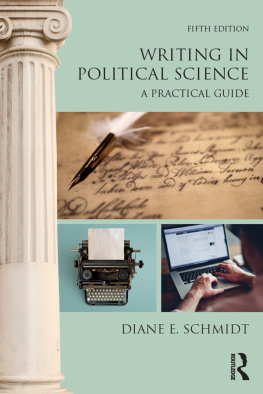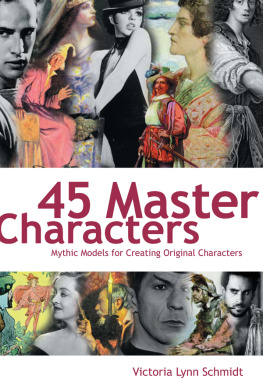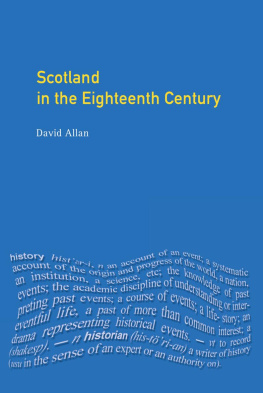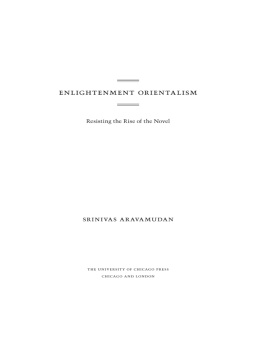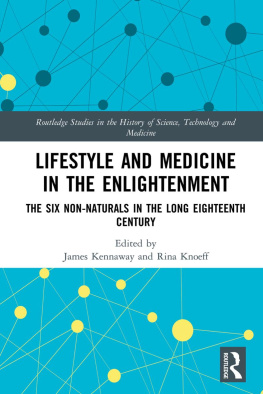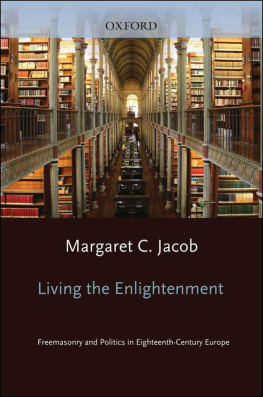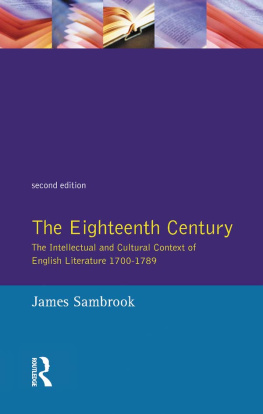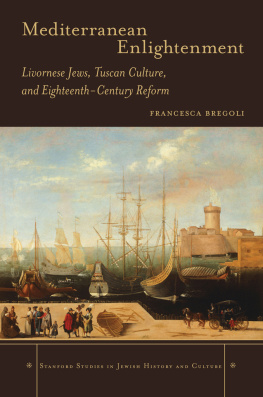Schmidt - What is enlightenment?: Eighteenth-century answers and twentieth-century questions
Here you can read online Schmidt - What is enlightenment?: Eighteenth-century answers and twentieth-century questions full text of the book (entire story) in english for free. Download pdf and epub, get meaning, cover and reviews about this ebook. City: Berkeley, year: 2004, publisher: University of California Press, genre: Politics. Description of the work, (preface) as well as reviews are available. Best literature library LitArk.com created for fans of good reading and offers a wide selection of genres:
Romance novel
Science fiction
Adventure
Detective
Science
History
Home and family
Prose
Art
Politics
Computer
Non-fiction
Religion
Business
Children
Humor
Choose a favorite category and find really read worthwhile books. Enjoy immersion in the world of imagination, feel the emotions of the characters or learn something new for yourself, make an fascinating discovery.
What is enlightenment?: Eighteenth-century answers and twentieth-century questions: summary, description and annotation
We offer to read an annotation, description, summary or preface (depends on what the author of the book "What is enlightenment?: Eighteenth-century answers and twentieth-century questions" wrote himself). If you haven't found the necessary information about the book — write in the comments, we will try to find it.
Schmidt: author's other books
Who wrote What is enlightenment?: Eighteenth-century answers and twentieth-century questions? Find out the surname, the name of the author of the book and a list of all author's works by series.
What is enlightenment?: Eighteenth-century answers and twentieth-century questions — read online for free the complete book (whole text) full work
Below is the text of the book, divided by pages. System saving the place of the last page read, allows you to conveniently read the book "What is enlightenment?: Eighteenth-century answers and twentieth-century questions" online for free, without having to search again every time where you left off. Put a bookmark, and you can go to the page where you finished reading at any time.
Font size:
Interval:
Bookmark:
SELECT BIBLIOGRAPHY
This bibliography falls into three sections. The first part lists collections and reprints of eighteenth-century German discussions of the nature and consequences of enlightenment. The second focuses on some of the more important historical studies of the German Enlightenment with special attention to studies of the writers translated in the first part of this book and of the themes they addressed. The third concentrates on literature discussing or developing the issues raised in the last part of this book.
I. REPRINTS OF EIGHTEENTH-CENTURY TEXTS ON THE NATURE AND CONSEQUENCES OF ENLIGHTENMENT
Bahr, Ehrhard, ed. Was ist Aufklrung? Thesen und Definitionen. Stuttgart: Reclam, 1974.
Batscha, Zwi, ed. Aufklrung und Gedankenfreiheit: 15 Anregungen, aus der Geschichte zu lernen. Frankfurt am Main: Suhrkamp, 1977.
____.Despotismus von jeder Art reizt zur Widersetzlichkeit: Die Franzsische Revolution in der deutsche Popularphilosophie. Frankfurt am Main: Suhrkamp, 1989.
Eberle, Friedrich, and Theo Stammen, eds. Die Franzsische Revolution in Deutschland:Zeitgenssische Texte deutscher Autoren. Stuttgart: Reclam, 1989.
Garber, Jrn, ed. Kritik der Revolution. Theorie des deutschen Frhkonservatismus 1790-1810. Kronberg/Ts.: Scriptor, 1976.
____, ed. Revolutionre Vernunft. Texte zur jakobischen und liberalen Revolutionsrezeption in Deutschland 1789-1810. Kronberg/Ts.: Scriptor, 1974.
Geismar, Martin von [pseudonym for Edgar Bauer], ed. Bibliothek der deutschen Aufklrer des achtzehnten Jahrhunderts. [1846] Reprint. Darmstadt: Wissenschaftliche Buchgesellschaft, 1963.
Hinske, Norbert, and Michael Albrecht, eds. Was ist Aufklrung? Beitrge aus der Berlinischen Monatsschrift. 4th ed. Darmstadt: Wissenschaftliche Buchgesellschaft, 1990.
Reinhold, Karl Leonhard. Schriften zur Religionskritik und Aufklrung 1782-1784. Ed. Zwi Batscha. Bremen: Jacobi Verlag, 1977.
Weber, Peter, ed. Berlinische Monatsschrift (1783-1796): Auswahl. Leipzig: Reclam, 1986.
II. HISTORICAL AND CRITICAL STUDIES OF THE GERMAN ENLIGHTENMENT
Agethen, Manfred. Geheimbund und Utopie: Illuminaten, Freimaurer und deutsche Sptaufklrung. Munich: Oldenbourg, 1984.
Albrecht, Wolfgang. Aufklrung, Reform, Revolution oder Bewirkt Aufklrung Revolutionen?' ber ein Zentralproblem der Aufklrungsdebatte in Deutschland. Lessing Yearbook 22 (1990): 1-75.
Alexander, W. M. Johann Georg Hamann: Metacritic of Kant. Journal of the History of Ideas 27 (1966): 137-144.
Allison, Henry E. Lessing and the Enlightenment. Ann Arbor: University of Michigan Press, 1966.
Altmann, Alexander. Moses Mendelssohn: A Biographical Study. University, Alabama: University of Alabama Press, 1973.
____.Die trostvolle Aufklrung: Studien zur Metaphysik und politische Theorie Moses Mendelssohns. Stuttgart-Bad Cannstatt: Frommann-Holzboog, 1982.
Anchor, Robert. The-Enlightenment Tradition. Berkeley and Los Angeles: University of California Press, 1979.
Aner, Karl. Die Theologie der Lessingzeit. Halle: Niemeyer, 1927.
Arkush, Allan. Moses Mendelssohn and the Enlightenment. Albany: State University of New York Press, 1994.
Axin, Sidney. Kant, Authority, and the French Revolution. Journal of the History of Ideas 32 (1971): 423-432.
Bahr, Ehrhard. Kant, Mendelssohnn, and the Problem of Enlightenment from Above.' Eighteenth-Century Life 8 (1982): 1-12.
Bahr, Ehrhard, Edward P. Harris, and Laurence G. Lyon, eds. Humanitt und Dialog: Lessing und Mendelssohn in neuer Sicht: Beitrge zum Internationalen Lessing-Mendelssohn-Symposium anllich des 250. Geburtstages von Lessing und Mendelssohn. Detroit: Wayne State University Press, 1982.
Bahr, Ehrhard, and Thomas P. Saine, eds. The Internalized Revolution: German Reactions to the French Revolution, 1789-1989. New York: Garland, 1992.
Bal, Karol. Aufklrung und Religion beim Mendelssohn, Kant, und dem jungen Hegel. Deutsche Zeitschrift fr Philosophie 27 (1979): 1248-1257.
Barnard, Frederick M. Aufklrung' and Mndigkeit: Thomasius, Kant, Herder. Deutsche Vierteljahresschrift fur Literaturwissenschaft und Geistesgeschichte 57 (1983): 278-297.
Bayer, Oswald. Hamanns Metakritik im ersten Entwurf. Kantstudien 81 (1990): 435-453.
____. Selbstverschuldete Vormundschaft: Hamanns Kontroverse mit Kant um wahre Aufklrung. In Der Wirklichkeitsanspruch von Theologie und Religion, ed. Dieter Henke. Tbingen: J. C. B. Mohr, 1976.
_____. Zeitgenosse im Widerspruch: Johann Georg Hamann als radikaler Aufklrer. Munich: Piper, 1988.
Beck, Lewis White. Kant and the Right of Revolution. Journal of the History of Ideas 32 (1971): 411-422.
Begemann, Christoph. Furcht und Angst im Prozess der Aufklrung. Zur Literatur- und Bewutsein- geschickte des 18. Jahrhunderts. Frankfurt am Main: Athenum, 1987.
Behrens, C. ?. A. Society, Government, and the Enlightenment: The Experiences of Eighteenth-Century France and Prussia. New York: Harper and Row, 1985.
Beiser, Frederick C. Enlightenment, Revolution, and Romanticism. Cambridge: Harvard University Press, 1992.
____. The Fate of Reason: German Philosophy from Kant to Fichte. Cambridge: Harvard University Press, 1987.
Belaval, Yvon. L'Aufklaerung a Contre-Lumires. Archives de Philosophie 42 (1979): 631-634.
Blanke, Horst Walter. Aufklrung und Historik: Aufstze zur Entwicklung der Geschichtswis-senschaft, Kirchengeschichte und Geschichtstheorie in der deutschen Aufklrung. Waltrop: Spenner, 1991.
Blanning T.C.W. The Enlightenment in Catholic Germany. In The Enlightenment in National Context, ed. Roy Porter and Mikuls Teich. Cambridge: Cambridge University Press, 1981.
. France during the French Revolution through German Eyes. In The Impact of the French Revolution on European Consciousness, ed. H. T. Mason and W. Doyle. Gloucester: Alan Sutton, 1989.
____. Reform and Revolution in Mainz, 1743-1803. New York: Cambridge University Press, 1974.
Bdeker, Hans Erich. Aufklrung als Kommunikationsprozess. Aufklrung 2 (1987): 89-111.
Bdeker, Hans Erich, and Ulrich Herrmann, eds. Aufklrung als Politisierung, Politisier-ung der Aufklrung. Hamburg: F. Meiner, 1987.
____. ber den Prozess der Aufklrung in Deutschland im 18. Jahrhundert: Personen, Institutionen und Medien. Gttingen: Vandenhoeck and Ruprecht, 1987.
Bdeker, Hans Erich, et al. Aufklrung und Geschichte: Studien zur deutschen Geschichtswis-senschaft im 18. Jahrhundert. Gttingen: Vandenhoeck and Ruprecht, 1986.
Bdeker, Hans Erich, and Per Ohrgaard, eds. Aufklrung als Problem und Aufgabe: Fest-schrift fr Sven-Aage Jorgensen. Munich: Fink, 1994.
Bning, Holger. Volksaufklrung: Bibliographisches Handbuch zur Popularisierung aufklrerischen Denkens im deutschen Sprachraum von den Anfangen bis 1850. Stuttgart-Bad Cann-stadt: Frommann-Holzboog, 1990.
, ed. Franzsische Revolution und deutsche ffentlichkeit: Wandlungen in Presse und Alltagskultur am Ende des achtzehnten Jahrhunderts. Munich: ?. G. Saur, 1992.
Bourel, Dominique. Moses Mendelssohn et l Aufklrung. Dix-huitime Sicle 10 (1968): 13-21.
Bruch, J. L. Kanteties Lumires. Revue de Mtaphysique et Morale 79 (1974): 457-472.
Brggemann, Fritz. Das Weltbild der deutschen Aufklrung. Philosophische Grundlagen und Literarische Auswirkung: Leibniz, Wolff, Gottsched, Brockes, Haller. Leipzig: P. Reclam, 1930.
Brunschwig, Henri. Enlightenment and Romanticism in Eighteenth-Century Prussia. Chicago: University of Chicago Press, 1974.
Bchsei, E. Aufklrung und christliche Freiheit: J. G. Hamann contra I. Kant.
Next pageFont size:
Interval:
Bookmark:
Similar books «What is enlightenment?: Eighteenth-century answers and twentieth-century questions»
Look at similar books to What is enlightenment?: Eighteenth-century answers and twentieth-century questions. We have selected literature similar in name and meaning in the hope of providing readers with more options to find new, interesting, not yet read works.
Discussion, reviews of the book What is enlightenment?: Eighteenth-century answers and twentieth-century questions and just readers' own opinions. Leave your comments, write what you think about the work, its meaning or the main characters. Specify what exactly you liked and what you didn't like, and why you think so.

